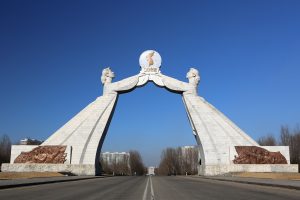The recent March 25 ballistic missile tests by North Korea have further underscored the failure of Washington policymakers to effectively engage the Democratic People’s Republic of Korea (DPRK). While previous U.S. administrations have consistently failed to denuclearize North Korea, the freshly minted Biden administration has a rare opportunity to formulate a new, effective policy to achieve regional peace and economic prosperity on a nuclear-free Korean peninsula.
To break the historic chain of U.S. policy deficiencies, Biden needs to mobilize China’s cooperation to realize the verifiable, and irreversible dismantlement of North Korea’s nuclear program. While solely wielding the power of economic sanctions, and remaining Kim Jong Un’s singular socialist ally, only China can shelter or compel North Korea.
Biden must propose a package deal that Kim can’t refuse: The best chance of survival, in giving up nuclear weapons for the compensation of a genuine opportunity for economic modernization and joining the international community as a respected country. To be induced to accept the deal, Kim must see the current path — the option of survival with nuclear weapons — as unbearably costly.
Yet, past decades have demonstrated the futility of U.S. bilateral negotiations with North Korea. Such a deal won’t succeed without enlisting China’s cooperation.
Just like the United States, China has a strategic interest in the denuclearization of North Korea. Primarily, President Xi Jinping considers North Korea’s possession of nuclear weapons a threat to China’s security interests because of the potential for further proliferation and military armament in East Asia, namely in Japan and South Korea. Secondly, the 28,500 U.S. troops and military assets in South Korea, stationed as a deterrent to North Korean aggression, undermine China’s security interests.
Furthermore, Xi has reservations about Kim’s trustworthiness and destabilizing rhetoric. Over the past decade, Kim has pursued nuclear brinkmanship in spite of strong warnings from Xi. North Korean propaganda portrays China as abandoning “true” socialism for capitalism, and Beijing is a realistic nuclear target in the event of extreme escalation.
Nevertheless, China needs North Korea as an ally, as they have continuously served as a buffer zone to counterbalance U.S. regional influence. Importantly, China has only provided superficial support for nuclear dismantlement because they’ve calculated that North Korea would swiftly collapse after dismantling its nuclear weapons without a new strategy for survival. Despite North Korea’s belligerence and unpredictability, the prospect of collapse would be acutely destabilizing to the region.
To circumvent collapse, China has been providing North Korea with essential aid, even in violation of the Chinese-certified 2017 U.N. Security Council sanctions, which target oil imports, and mineral, seafood, and textile exports. North Korea’s economy remains in dire disrepair. Accounting for $4.6 billion of North Korea’s $5 billion total trade volume in 2017, China’s influence over the country’s economy has only grown. COVID-19 border closures have further demonstrated the effectiveness of economic sanctions, as Chinese trade has dropped to a meager $491 million, thrusting the North Korean economy into an escalating crisis.
Biden can muster Xi’s unwavering support for a package deal, which gives North Korea a credible opportunity to survive and economically thrive by adding the most attractive promise — U.S. military withdrawal from South Korea. A denuclearized North Korea will continue to serve as a geopolitical buffer zone for China against the U.S., South Korea, and Japan, while simultaneously delegitimizing the regional military buildup. Not only will the Korean peninsula become entirely nuclear-free, but North Korea will contribute to peace and economic prosperity.
As I have written, a package deal which trades North Korea’s nuclear weapons and ruling ideology for security guarantees, market oriented economic reform and opening, a blueprint for economic modernization, and an international development fund is the only viable solution.
Transforming North Korea into a peaceful and prosperous country is the best outcome from each country’s security calculations, but it requires unwavering commitment from each member. To succeed, Biden needs to formulate a plan that will not only produce permanent peace and stability, but also economic prosperity. With such a plan, Xi can be definitively persuasive in inducing Kim to accept such a transformation.
A critical component of a viable package deal are credible security guarantees. North Korea should sign peace treaties with South Korea and the U.S., and reaffirm defense pacts with China and Russia. All economic sanctions must be lifted, and diplomatic relations normalized, to correspond to North Korea’s new, amiable foreign policy.
But security guarantees alone aren’t sufficient. To survive, North Korea must undergo market-oriented economic reform and transform into a vibrant, prosperous country. The blueprint for economic modernization includes plans for infrastructure, institution building, and the development of human resources.
An economic development fund must be large enough, and last sufficiently long enough, to pave the foundation for North Korea’s economic modernization – $300 billion over 10 years to stimulate an average annual GDP growth rate of at least 10 percent. Then, North Korea must stand on its own without continued aid.
Diplomacy is not a zero sum game. The package deal is a groundbreaking opportunity to work together in promoting stability and humanity, but U.S. attempts to contain China through the Quad alliance will certainly thwart any joint initiatives.
The shared strategic objective in the denuclearization of North Korea is a rare moment for two adversaries to align on a common endeavor to forge truly lasting peace. Successfully achieving a nuclear-free Korean peninsula with a package deal will not only drastically improve the well-being of 25 million North Korean people, but it will also be a testing case for two superpowers to build a better, more peaceful, world.

































